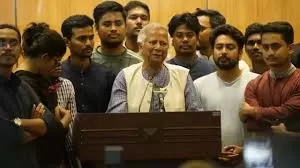Bangladesh’s Growing Friction with India: A Diplomatic Tightrope
In recent months, tensions between Bangladesh and India have escalated, as Dhaka questions decades-old agreements with its larger neighbor. Once a close ally, Bangladesh now finds itself challenging several bilateral deals, especially those signed under former Prime Minister Sheikh Hasina.

The country's current government, led by Prime Minister Mohammad Yunus, seems to be taking a more contentious approach toward India, further stoking diplomatic tensions. From border disputes to alliances with former adversaries, Dhaka’s actions have raised serious concerns in New Delhi, prompting a closer examination of the shifting dynamics between the two South Asian neighbors.
Rewriting the Past: Bangladesh’s Re-evaluation of Bilateral Agreements
One of the primary points of contention between Bangladesh and India is the claim that some of the long-standing bilateral agreements between the two countries have been unequal. The current government in Dhaka argues that past deals, particularly those negotiated under Sheikh Hasina’s leadership, have disproportionately favored India. This has led to calls for renegotiating or, in some cases, scrapping these agreements altogether. The most immediate issue for Bangladesh is the border, which has historically been a sensitive topic for both nations.
Bangladesh’s Home Minister, Jahangir Alam Chri, has openly questioned the fairness of the border deals, citing India’s actions along the international border. In particular, Dhaka claims that India is illegally building fences and structures near the border, which it argues violates previous agreements. This has sparked tensions and calls for a review of the border agreements, especially ahead of an upcoming meeting scheduled in New Delhi. The chiefs of the border forces of both countries are set to hold talks in the coming weeks, with Bangladesh expected to bring a list of grievances to the table.
Bangladesh’s Border Complaints: A New Diplomatic Stand
Some of the specific issues that Bangladesh plans to raise during the upcoming talks include:
- India’s alleged illegal construction activities near the border, which Dhaka claims undermine the integrity of the international boundary.
- Allegations that India is responsible for the shooting of Bangladeshi nationals along the border, a claim that could further complicate relations.
- Accusations of drug smuggling from India to Bangladesh, with Dhaka pushing for stronger cooperation in combating cross-border criminal activities.
In response, India has consistently emphasized its commitment to border security and the need for a crime-free border. The Indian government has expressed its hope that Bangladesh will honor earlier agreements and take a cooperative approach to address cross-border crime. During a diplomatic exchange earlier this month, India summoned Bangladesh’s High Commissioner to express these concerns and reiterate its position on the need for constructive cooperation.
The Political Context: Bangladesh’s Shifting Alliances
The tension between India and Bangladesh is not solely driven by border issues. It is also rooted in political and diplomatic shifts. The current Bangladeshi government, under Yunus’s leadership, has increasingly distanced itself from India, moving closer to nations such as Pakistan, which have historically been adversaries of India.
For instance, just last week, Bangladesh hosted a delegation of Pakistani officials, including members of the Inter-Services Intelligence (ISI), sparking alarm in New Delhi. This marks a significant shift in Dhaka’s foreign policy, as Bangladesh seeks to forge stronger ties with Pakistan despite the historical animosity between the two nations. In addition to military cooperation, Bangladesh and Pakistan have also strengthened their economic and trade ties, with direct maritime links and flight routes now being established between the two countries.
This pivot toward Pakistan is seen as a strategic move by Dhaka to counterbalance India’s influence in the region. The growing military and diplomatic partnership between Bangladesh and Pakistan highlights the changing geopolitical landscape in South Asia, with Bangladesh now diversifying its alliances beyond India.
The United States and the Influence of George Soros
Bangladesh’s foreign policy recalibration extends beyond its relations with India and Pakistan. Dhaka is also seeking to expand its connections with the United States, particularly under the administration of President Joe Biden. Muhammad Yunus, who was once closely aligned with the Biden administration, hosted Alex Soros, the son of American billionaire George Soros, in Dhaka. Soros, a prominent philanthropist known for funding civil society groups around the world, has been a controversial figure in India, with many accusing him of meddling in domestic affairs. Despite this, Yunus appears eager to strengthen ties with Soros and his network of civil society organizations, which could give Bangladesh additional leverage in global diplomacy.
While Bangladesh may not receive the same level of support from the U.S. under the Trump administration, its growing ties with Washington could provide a counterbalance to India’s regional dominance. The potential for closer cooperation with the U.S. could open new doors for Bangladesh, allowing it to diversify its diplomatic and economic partnerships.
India’s Response: Balancing Diplomacy and National Interests
For India, Bangladesh’s increasingly antagonistic stance presents a significant challenge. The prospect of an unfavorable regime in Dhaka poses several risks, including the potential for increased illegal migration, smuggling, and the infiltration of weapons into India’s northeastern states. This could lead to greater instability in the region, with Pakistan potentially gaining a foothold in areas that are critical to India’s national security.
India has made efforts to engage with Bangladesh diplomatically, as evidenced by the visit of India’s Foreign Secretary to Dhaka last year, where he called for more cooperation and communication between the two nations. However, India must be prepared for all eventualities, especially if Bangladesh continues to question past agreements and strengthen ties with India’s adversaries. As the situation unfolds, India will need to carefully navigate this diplomatic tightrope, balancing its national interests with the need for regional stability.
Conclusion: A Crucial Time for Vigilance
The changing dynamics between India and Bangladesh present both challenges and opportunities for New Delhi. While India has always emphasized cooperation and dialogue with its neighbor, the growing tensions over border issues and political realignments necessitate a more cautious approach. As Bangladesh moves closer to Pakistan and seeks to challenge longstanding agreements, India must remain vigilant in safeguarding its interests while maintaining open channels of communication with Dhaka.
The current situation highlights the complex nature of international relations, where political regimes and alliances shift over time. As Bangladesh seeks to diversify its foreign policy options, it is clear that India will need to be prepared for a range of potential scenarios, including a more adversarial relationship with its eastern neighbor. For now, India’s best course of action is to strengthen its diplomatic efforts and ensure that any agreements with Bangladesh are honored, while also keeping a close watch on developments in the region.
What's Your Reaction?















